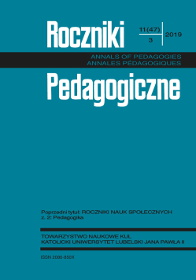Effective Organizational Culture of Family Firms –the Perspective of Future Successors: a Qualitative Study
Main Article Content
Abstract
Family is the source of trust, loyalty and sense of belonging based on relations which are also the core of business. While running a business by family seems a logical thing to do, a double role played by family members may impede company’s functioning. The present paper aims at exploring the meaning making of the employees who are future successors with regards to organizational culture characteristics associated with effective business performance of family firms. 32 future successors took part in the study. Semi-structured interviews were analyzed through Interpretative Phenomenological Analysis. The findings comprised following categories: trust, sense of “we,” entrepreneurial upbringing, and immediacy in communication which may comprise a model explicating complex organizational culture of family businesses. The results provided extensive future research directions into the field of family business.
Article Details
References
Carsurd, A.L. and Brannback, M. (2012). Understanding Family Business. New York: Springer.
DiMaggio, P. (1997). Culture and cognition. Annual review of sociology, 23, 263–287.
Edmondson, A. (1999). Psychological Safety and Learning Behavior in Work Teams. Administrative Science Quarterly, 44(2), 350–383.
GUS (2015). Małe i średnie przedsiębiorstwa niefinansowe w Polsce w latach 2009-2013. Warszawa: Zakład Wydawnictw Statystycznych.
Haugh, H. & McKee, L. (2004). The cultural paradigm of the smaller firm. Journal of Small Business Management, 42(4), 377–394.
Hitt, M.A., Sirmon, D.G., Ireland R.D. (2007). Managing firm resources in dynamic environments to create value: looking inside the black box. Academy of Management Review, 32(1), 273–292.
Kerr, M., Stattin, H. & Trost, K. (1999). To know you is to trust you: Parents’ trust is rooted in child disclosure of information. Journal of adolescence, 22(6), 737–752.
Kirkwood, J. (2007). Igniting the entrepreneurial spirit: is the role parents play gendered? International Journal of Entrepreneurial Behavior & Research, 13(1), 39–59.
McClure, J.P. & Brown, J.M. (2008). Belonging at work. Human Resource Development International, 11(1), 3–17
Morris, M.H., Williams, R.O., Allen, J.A. & Avila, R.A. (1997). Correlates of success in family business transitions. Journal of business venturing, 12(5), 385–401.
Mulholland, K. (1997). The Family Enterprise and Business Strategies. Work Employment & Society, 11(4), 685–711.
Parker, S.K., Williams, H.M. & Turner, N. (2006). Modeling the antecedents of proactive behavior at work. Journal of applied psychology, 91(3), 636–652.
Wheelock, J. & Baines, S. (2004). Balancing work and family life in disadvantaged small business households. In: J. Targalski (eds.), Entrepreneurship, Employment and Beyond (pp. 157–12). Krakow: University of Economics Publishers.
Wilderom, C.P.M., Van den Berg, P.T., Glunk, U. & Maslowski, R. (2001). Beyond the handbook: organizational culture. In 61st Academy of Management Annual Meeting 2001: How Governments Matter. Washington, United States.

